LEED is coming under scrutiny as five green-building consultants from the U.S., B.C., Alberta, and Ontario tackle the question of whether LEED is still relevant in 2016 at this year’s Buildex Vancouver, which takes place today and tomorrow at the Vancouver Convention Centre West.
Panel organizer and moderator Andrée Iffrig, LEED AP, said the five speakers are all renowned in the field, hold diverse views and can speak freely as the session is not sponsored by the Canada Green Building Council, which oversees the LEED program in Canada. She says she doubts such a panel would have been formed a few years ago.
"It would have seemed unprofessional," she said, as panel members have LEED credentials, but added the time has come to put the 10-year-old Canadian program under the microscope. "This is not about LEED-bashing, but we do need to ask some questions."
Iffrig is the leader of the sustainability team at Alberta’s DIRTT Environmental Solutions.
Questions raised by Iffrig and panel members include: whether LEED, especially LEED version 4 (v4), is too complex? Is LEED compatible with lean and modular building concepts that are changing the construction industry? Does LEED fit with climate change concerns now being expressed? Are LEED structures truly energy efficient? Is LEED being used more as a promotional or marketing tool rather than developing holistic attributes that impact the environment and those living and working in the space?
Panel members are Doug Webber, associate vice-president, sustainability and energy, WSP Canada;
Sébastien Garon, Architect AIBC, LEED AP BD + C, principal, Sébastien Garon Architecture + Design; Helen Goodland, principal, Brantwood Consulting; Graham Twyford-Miles, associate and practice lead, sustainable solutions, Stantec; and Eden Brukman, founder and principal, Concenter Solutions.
Twyford-Miles said the question of LEED’s relevancy is also related to other systems on the market.
"There is a rating system rivalry that has been going on for a long time and is getting the attention of the industry. LEED is now just one of the tools in the toolbox that brings forward the objective of a building’s owner," he said. "The fact it is not the only game in town is not a negative." He sees LEED’s relevancy issue as another area to examine.
"How do we improve what we have (in LEED) and leverage the existing capacity to move it further along rather than chipping away at the margins of LEED," he said.
Webber sees the question of LEED’s relevance as one of timing, as green building is becoming more mainstream and a brighter spotlight is being focused upon the concept of building structures that are sustainable.
"It is really about change; change in the marketplace," he said. "It is about elevating the sustainability in buildings and critiquing LEED as part of the conversation."
LEED has been a major factor in pushing sustainability construction despite criticisms that it is becoming too cumbersome to deal with and adds approximately one per cent to building costs.
A recent Canada Green Building Council news release calls 2015 a watershed year. It noted that 527 LEED projects were certified between Jan. 1 and Dec. 31, bringing the total of certified projects in Canada to 2,576 — a total of approximately 34 million square metres of certified space. Gold and platinum rated buildings increased over 2014 by 6.2 and 28.6 per cent, respectively. Canada also saw its first LEED v4 certified project in October — 13 projects by year end were registered.
Thomas Mueller, president and CEO of the Canada Green Building Council, said: "We are now focusing on the federal government to leverage green building as an actionable solution to reaching Canada’s climate change commitments."
Goodland said the question of LEED’s relevance needs to be examined in light of a changing construction industry.
She said the industry has reached a threshold of efficiencies in construction using conventional building methods.
"We have reached the limit where we can improve with the existing practices," she said.
As new concepts such as modular and lean construction move forward, she said: "The question is the degree to which these practices are transferable into the rating system."
LEED gives little recognition for efficiencies achieved by modular construction, she points out. There is also the need to question whether the awards and medals that are given to LEED buildings are garnered more as a promotional and a marketing tool or whether they are the result of building owners and design teams moving towards sustainability objections.
Webber said there is also a need to clarify misunderstandings that are emerging regarding LEED structures and their performance levels.
"Whether they fulfill their potential will depend upon how they are operated," he said, adding such downstream comparisons with other non-LEED structures may not yield a true picture. Iffrig said she is hopeful the session, which takes place Feb. 24, will be attended by green building experts who will discuss areas where LEED may be faltering in its relevance despite going through various versions. "We need to open the conversation. What does LEED need to do to continue to transform itself?" she said.
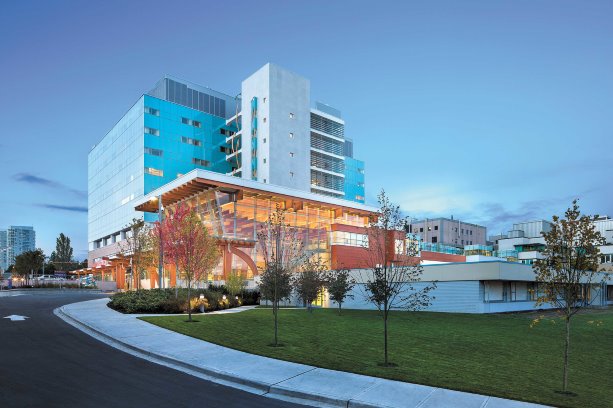
Surrey Memorial Hospital is one of many projects in Canada to be certified LEED Gold.
Photo: EllisDon"

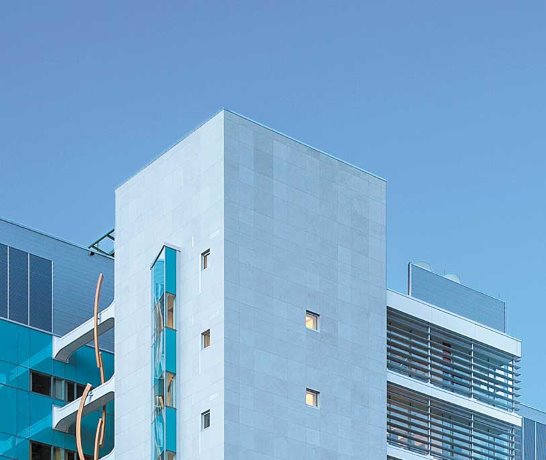

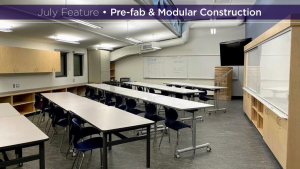



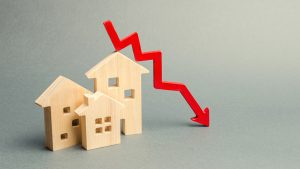
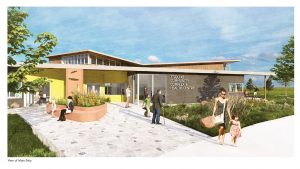

Recent Comments
comments for this post are closed